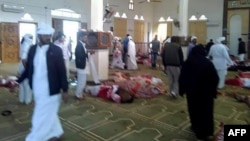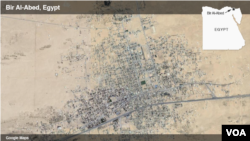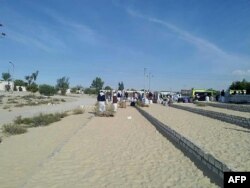Egyptian security officials, quoted by state-run media, say 235 people have been killed by suspected militants in an attack on a packed mosque Friday in the volatile northern Sinai Peninsula.
Frightened residents fled the center of the town of Bir al Abed, after Islamic militants fired on people both inside and outside the Rawda mosque. Scores of bodies were strewn across the mosque's carpeted floor.
A man claiming to have been inside the mosque during the attack told Arab media that militants in four-wheel drive vehicles opened fire inside the house of worship following an explosion.
Eyewitnesses also say the militants fired on ambulances as emergency personnel tried to evacuate the wounded to hospitals in nearby Arish. Egyptian media reported that several government targets also were attacked inside the town.
Egyptian government warplanes reportedly attacked terrorist targets in Sinai following the carnage at the mosque.
U.S. President Donald Trump reacted to the violence, calling it a "Horrible and cowardly terrorist attack on innocent and defenseless worshipers in Egypt." The president added, "The world cannot tolerate terrorism, we must defeat them militarily and discredit the extremist ideology that forms the basis of their existence!" in a tweet sent from the U.S. state of Florida, where he is staying over the Thanksgiving holiday weekend.
Neighboring Israel sent condolences to Egypt following the attack. Israel and Egypt signed a peace treaty in 1979 and maintain close security cooperation.
Ongoing war
Egyptian Culture Minister Helmy Namnam said on Egyptian TV that the attack was "part of an ongoing war that the Muslim Brotherhood group and its allies are waging against Egypt."
Several other former government officials made similar claims. The Muslim Brotherhood denied responsibility following previous terror attacks.
Egypt's Islamic endowments minister told government media the militants are resorting to extremely brutal attacks because they are becoming desperate:
He says that attacking mosques is the last card they have to play. They have attacked churches before, claiming the victims were infidels, but now they are attacking mosques, because their previous attacks failed. He says they are proving that it is they who, in fact, are enemies of God.
Influx of militants
Arab media have reported a recent influx of Islamic militants from Iraq and Syria to parts of North Africa, including Egypt and Libya. Egyptian media have accused Qatar and Turkey of helping terrorists to flee Iraq and Syria to North Africa. Qatar and Turkey deny the accusations.
Veteran Egyptian editor and publisher Hisham Kassem recently told VOA that part of the problem is that Egyptian security forces need better training to deal with acts of terrorism.
"For years, there was talk that it was necessary to recalibrate the police force and at least part of the military to become counterterrorism forces and, unfortunately, we know of very few programs that have actually taken place to make a serious shift," Kassem said.
Egyptian media reported that President Abdel Fattah el Sisi met with top security officials, including the defense and interior ministers, immediately after the attack as security was stepped up around government buildings and key infrastructure.






